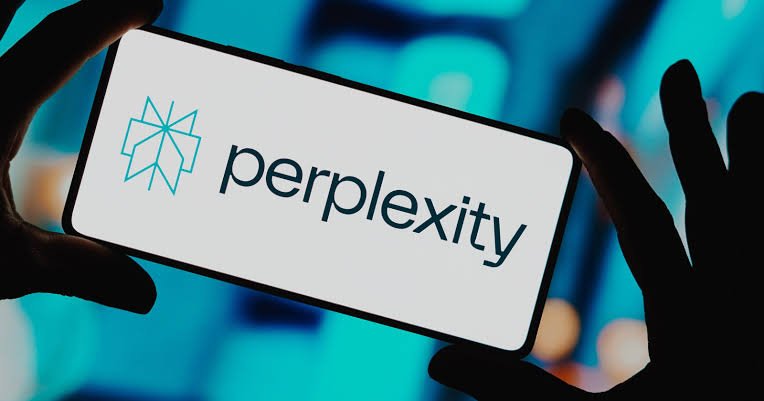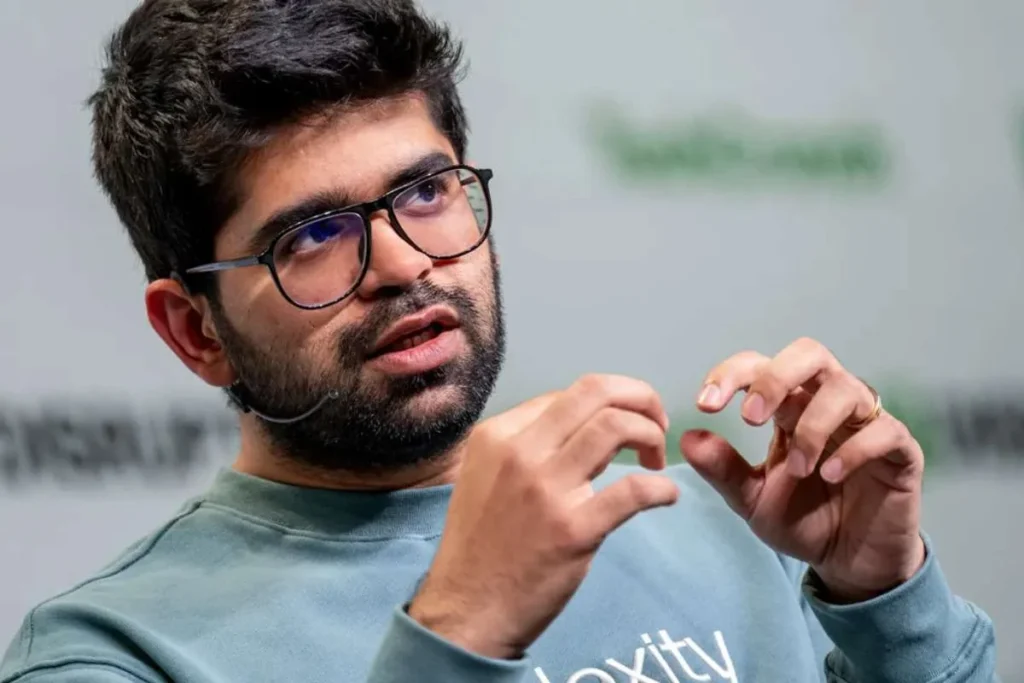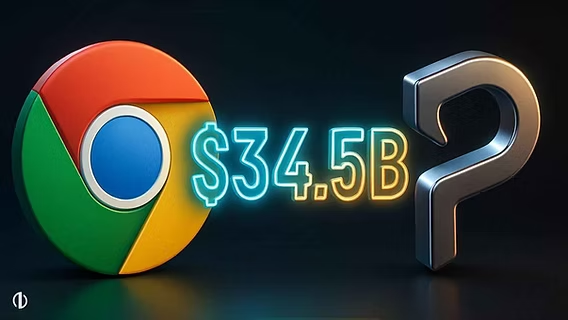In a twist no one saw coming, Perplexity AI, the young artificial intelligence company that has been making waves in Silicon Valley, has put forward a staggering $34.5 billion (₦34.5 trillion) bid to acquire Google Chrome, the world’s most popular web browser.
For Nigerians and Africans who rely on Chrome daily—whether for study, business, entertainment, or financial transactions—this move raises questions about the future of online access, digital inclusion, and the control of one of the internet’s most important gateways.
The bid was addressed directly to Sundar Pichai, the CEO of Google’s parent company, Alphabet. In its proposal, Perplexity promised that, if the deal were accepted, it would safeguard Chrome as a platform for open web access, while maintaining Google Search as the default engine.
This announcement, first reported in U.S. outlets, immediately set the tech world ablaze. Analysts, investors, and everyday internet users have all been left wondering: is this a genuine takeover attempt, or simply a bold publicity stunt?
Table of Contents

A Young Challenger with Billion-Dollar Ambitions
To understand the magnitude of this offer, one must first look at Perplexity AI itself. Founded just three years ago by Aravind Srinivas, a former researcher at both OpenAI and Google, the company has quickly climbed the ladder of artificial intelligence innovation.
Its product line includes Comet, a next-generation AI-powered browser that has been described as a potential challenger to Google’s dominance in online search and browsing. With backing from big names like Jeff Bezos and Nvidia, Perplexity has managed to secure a position as one of the fastest-growing AI firms in the world.
Still, the idea of a startup, barely out of its infancy, attempting to acquire Google Chrome—the browser used by over 3 billion people worldwide—sounds audacious, even outrageous.
Yet, this boldness reflects a broader trend in tech. Smaller, agile companies are increasingly challenging the dominance of established giants by questioning not just technology, but ownership models.
For Africans, where internet penetration is rising rapidly, such moves could have major implications. Nigeria, for instance, has over 122 million internet users, most of whom rely heavily on Chrome and Android devices. The future of such platforms affects education, e-commerce, social interaction, and even governance.
Between Bold Vision and Industry Scepticism
Despite the noise surrounding the bid, industry experts remain unconvinced. Many argue that Chrome, if ever put on the market, would be worth far more than $34.5 billion.
Tomasz Tunguz, managing director of Theory Ventures, estimated Chrome’s value to be at least ten times higher than Perplexity’s offer. For context, Chrome is not just a browser; it is a vast ecosystem that controls how billions of users access the web. It integrates tightly with Gmail, YouTube, Google Docs, and Android, making it one of Google’s crown jewels.
Judith MacKenzie, a fund manager at Downing, praised the boldness of Perplexity’s move but warned:
“This is an unsolicited bid and is not actually funded yet. It looks more like a statement of intent than a concrete transaction.”
Others went further. Tech investor Heath Ahrens dismissed it outright, calling it a “stunt” meant to draw attention to Perplexity’s AI browser. And indeed, for many, the bid appears less about ownership and more about influence—placing Perplexity in the global spotlight.

But Perplexity insists its vision is serious. In its open letter to Google, the company highlighted three promises:
- Preserving user choice – Google would remain the default search engine, but users could freely change it.
- Supporting open source – Perplexity pledged continued investment in the Chromium project, the foundation upon which Chrome, Microsoft Edge, Opera, and other browsers are built.
- Ensuring safety and trust – The browser would be operated in the interest of users, not just corporate profit.
This framing—protecting Chrome as a “public good”—resonates in an era where users worry about privacy, monopolies, and big tech’s unchecked influence.
What This Could Mean for Nigeria and the World
The timing of Perplexity’s bid is particularly significant. Google is currently under intense legal scrutiny in the United States, where federal regulators are pursuing antitrust cases that challenge its dominance in online search and advertising. Some analysts believe Chrome, as a core gateway to the internet, could be one of the assets regulators eventually force Google to spin off.
If that were to happen, a sale—though unlikely to a small player like Perplexity—would suddenly become more plausible.
For Nigerians, whose economy increasingly depends on digital platforms, the implications are vast. Chrome dominates the browser market here, and any shift in ownership would touch millions of students, entrepreneurs, and businesses.
- Education: Nigerian students rely on Chrome for online classes, research, and e-libraries. Changes to the browser’s structure could affect accessibility.
- Business: From fintech startups to e-commerce platforms like Jumia, most Nigerian businesses depend on Chrome for customer access. Stability is crucial.
- Governance: With Nigeria expanding e-government platforms, Chrome plays a central role in how citizens engage with public services online.
A Nigerian tech analyst, Bolu Akinlade, explained:
“If Chrome were ever sold, Nigerians must ask: would the new owners respect affordability, privacy, and open access? Or would they introduce changes that could limit participation in the digital economy?”
This concern is not far-fetched. Tech history is full of acquisitions that started with bold promises but ended in restricted access or higher costs.
On the global stage, the symbolic power of Perplexity’s bid is undeniable. It signals that smaller players are no longer afraid to challenge tech monopolies. Even if Google rejects the offer, the conversation it sparks about who controls the gateways of the internet is invaluable.

Conclusion: Stunt or Start of a New Era?
So, what should we make of this dramatic play by Perplexity AI? Is it a calculated stunt designed to market its Comet AI browser, or a genuine attempt to buy Chrome?
The truth may lie somewhere in between. On one hand, the financial reality makes such a takeover nearly impossible—Google has little incentive to part with one of its most strategic assets. On the other hand, Perplexity has achieved what few startups can: it has placed itself at the centre of a global conversation about the future of browsing, AI, and user freedom.
Whether or not the deal goes through, Perplexity has already won attention and credibility. For Nigeria and Africa at large, the episode is a reminder of how global tech manoeuvres ripple into local realities. The fate of a browser like Chrome is not just a Silicon Valley drama; it is a matter that touches millions of lives across Lagos, Nairobi, Accra, and beyond.
And perhaps that is the most important lesson: in a digital world where tools like browsers shape how we learn, trade, and connect, ownership and openness matter. If Perplexity’s bold challenge sparks more debate, innovation, and accountability, then it has already reshaped the future—even without closing the deal.
Join Our Social Media Channels:
WhatsApp: NaijaEyes
Facebook: NaijaEyes
Twitter: NaijaEyes
Instagram: NaijaEyes
TikTok: NaijaEyes




